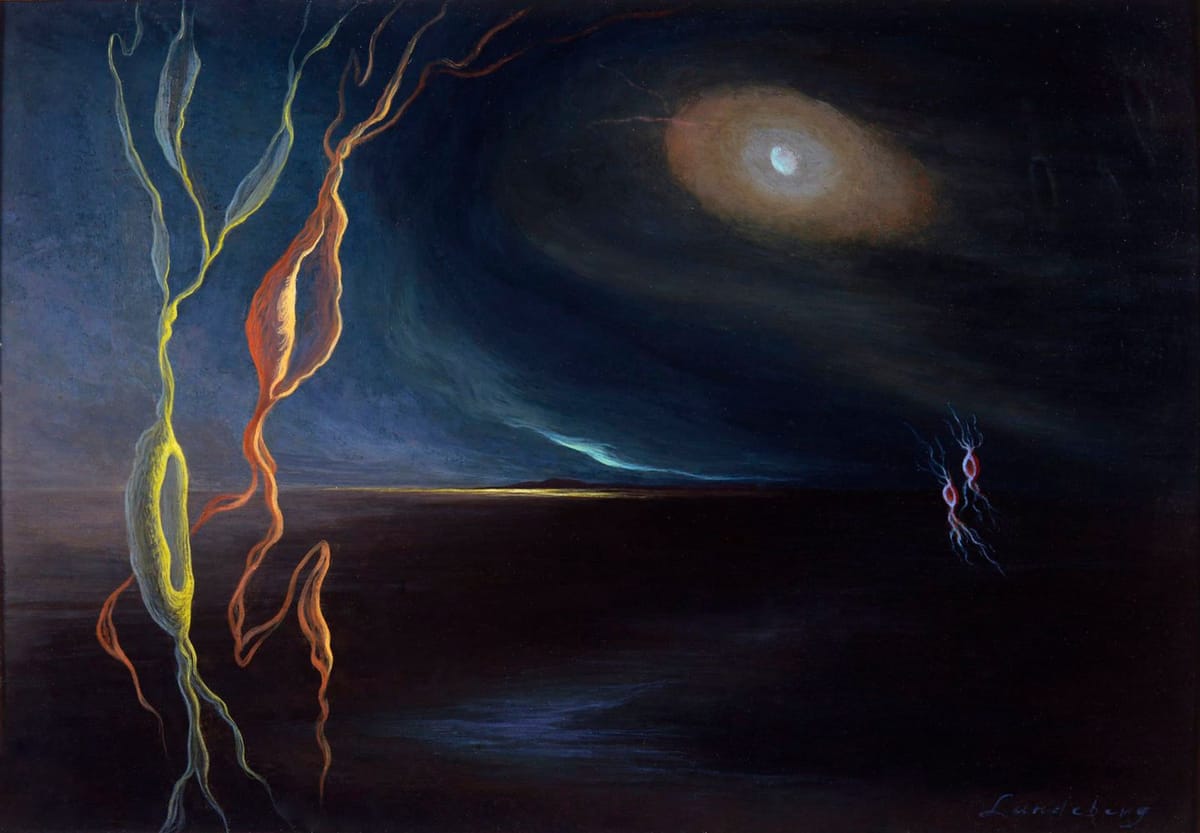Wednesday Reads: If You’re Not Voting for Biden, You’re Voting for the End of Democracy. Period.
Posted: May 1, 2024 | Author: bostonboomer | Filed under: abortion rights, democracy is threatened, Donald Trump, Joe Biden, Surreality | Tags: "presidential immunity", concentration camps, deportations, immigration, mob violence, state monitoring of pregnanacies, Supreme Court, Time interview with Trump |
Good Morning!!

Rene Magritte, The False Mirror, 1928
Yesterday, Time Magazine published an interview with Donald Trump. Why did he choose Time to reveal his plans for rescinding the Constitution if he is elected in November? I’d guess it’s because he wanted another Time cover to add to his collection. He’s a demented old man who doesn’t realize that Time long ago became fairly irrelevant. But they certainly got the attention of the the political world yesterday. Trump spelled out his plans for 2025 and beyond and they are horrifying.
I agree with this tweet that Aaron Rupar posted after reading the article:
I increasingly believe this election will be a referendum on whether anything matters anymore. There’s no rational case for Trump, but there’s a loud contingent on the left that just wants to burn it down. Combine that with low information voters and Republicans circling the wagons around their guy, and you have the outlines of a calamity. Hopefully people wake up.
Here’s the Time interview, followed by commentary from other publications. I’ve cut out the author’s cutesy commentary and just included Trump’s plans.
Eric Cortellessa at Time: How Far Trump Would Go.
Six months from the 2024 presidential election, Trump is better positioned to win the White House than at any point in either of his previous campaigns. He leads Joe Biden by slim margins in most polls, including in several of the seven swing states likely to determine the outcome. But I had not come to ask about the election, the disgrace that followed the last one, or how he has become the first former—and perhaps future—American President to face a criminal trial. I wanted to know what Trump would do if he wins a second term, to hear his vision for the nation, in his own words.
What emerged in two interviews with Trump, and conversations with more than a dozen of his closest advisers and confidants, were the outlines of an imperial presidency that would reshape America and its role in the world. To carry out a deportation operation designed to remove more than 11 million people from the country, Trump told me, he would be willing to build migrant detention camps and deploy the U.S. military, both at the border and inland. He would let red states monitor women’s pregnancies and prosecute those who violate abortion bans. He would, at his personal discretion, withhold funds appropriated by Congress, according to top advisers. He would be willing to fire a U.S. Attorney who doesn’t carry out his order to prosecute someone, breaking with a tradition of independent law enforcement that dates from America’s founding. He is weighing pardons for every one of his supporters accused of attacking the U.S. Capitol on Jan. 6, 2021, more than 800 of whom have pleaded guilty or been convicted by a jury. He might not come to the aid of an attacked ally in Europe or Asia if he felt that country wasn’t paying enough for its own defense. He would gut the U.S. civil service, deploy the National Guard to American cities as he sees fit, close the White House pandemic-preparedness office, and staff his Administration with acolytes who back his false assertion that the 2020 election was stolen.
Trump remains the same guy, with the same goals and grievances. But in person, if anything, he appears more assertive and confident. “When I first got to Washington, I knew very few people,” he says. “I had to rely on people.” Now he is in charge. The arranged marriage with the timorous Republican Party stalwarts is over; the old guard is vanquished, and the people who remain are his people. Trump would enter a second term backed by a slew of policy shops staffed by loyalists who have drawn up detailed plans in service of his agenda, which would concentrate the powers of the state in the hands of a man whose appetite for power appears all but insatiable. “I don’t think it’s a big mystery what his agenda would be,” says his close adviser Kellyanne Conway. “But I think people will be surprised at the alacrity with which he will take action.” [….]
In a second term, Trump’s influence on American democracy would extend far beyond pardoning powers. Allies are laying the groundwork to restructure the presidency in line with a doctrine called the unitary executive theory, which holds that many of the constraints imposed on the White House by legislators and the courts should be swept away in favor of a more powerful Commander in Chief.

TV Man, by Michael Vincent Manalo
Nowhere would that power be more momentous than at the Department of Justice. Since the nation’s earliest days, Presidents have generally kept a respectful distance from Senate-confirmed law-enforcement officials to avoid exploiting for personal ends their enormous ability to curtail Americans’ freedoms. But Trump, burned in his first term by multiple investigations directed by his own appointees, is ever more vocal about imposing his will directly on the department and its far-flung investigators and prosecutors.
In our Mar-a-Lago interview, Trump says he might fire U.S. Attorneys who refuse his orders to prosecute someone: “It would depend on the situation.” He’s told supporters he would seek retribution against his enemies in a second term. Would that include Fani Willis, the Atlanta-area district attorney who charged him with election interference, or Alvin Bragg, the Manhattan DA in the Stormy Daniels case, who Trump has previously said should be prosecuted? Trump demurs but offers no promises. “No, I don’t want to do that,” he says, before adding, “We’re gonna look at a lot of things. What they’ve done is a terrible thing.”
Trump has also vowed to appoint a “real special prosecutor” to go after Biden. “I wouldn’t want to hurt Biden,” he tells me. “I have too much respect for the office.” Seconds later, though, he suggests Biden’s fate may be tied to an upcoming Supreme Court ruling on whether Presidents can face criminal prosecution for acts committed in office. “If they said that a President doesn’t get immunity,” says Trump, “then Biden, I am sure, will be prosecuted for all of his crimes.” (Biden has not been charged with any, and a House Republican effort to impeach him has failed to unearth evidence of any crimes or misdemeanors, high or low.)
On his goal of mass deportation of immigrants:
Trump’s radical designs for presidential power would be felt throughout the country. A main focus is the southern border. Trump says he plans to sign orders to reinstall many of the same policies from his first term, such as the Remain in Mexico program, which requires that non-Mexican asylum seekers be sent south of the border until their court dates, and Title 42, which allows border officials to expel migrants without letting them apply for asylum. Advisers say he plans to cite record border crossings and fentanyl- and child-trafficking as justification for reimposing the emergency measures. He would direct federal funding to resume construction of the border wall, likely by allocating money from the military budget without congressional approval. The capstone of this program, advisers say, would be a massive deportation operation that would target millions of people. Trump made similar pledges in his first term, but says he plans to be more aggressive in a second. “People need to be deported,” says Tom Homan, a top Trump adviser and former acting head of Immigration and Customs Enforcement. “No one should be off the table.”
For an operation of that scale, Trump says he would rely mostly on the National Guard to round up and remove undocumented migrants throughout the country. “If they weren’t able to, then I’d use [other parts of] the military,” he says. When I ask if that means he would override the Posse Comitatus Act—an 1878 law that prohibits the use of military force on civilians—Trump seems unmoved by the weight of the statute. “Well, these aren’t civilians,” he says. “These are people that aren’t legally in our country.” He would also seek help from local police and says he would deny funding for jurisdictions that decline to adopt his policies. “There’s a possibility that some won’t want to participate,” Trump says, “and they won’t partake in the riches.”

Helen Lundeberg, Biological Fantasy, 1946
On Abortion:
As President, Trump nominated three Supreme Court Justices who voted to overturn Roe v. Wade, and he claims credit for his role in ending a constitutional right to an abortion. At the same time, he has sought to defuse a potent campaign issue for the Democrats by saying he wouldn’t sign a federal ban. In our interview at Mar-a-Lago, he declines to commit to vetoing any additional federal restrictions if they came to his desk. More than 20 states now have full or partial abortion bans, and Trump says those policies should be left to the states to do what they want, including monitoring women’s pregnancies. “I think they might do that,” he says. When I ask whether he would be comfortable with states prosecuting women for having abortions beyond the point the laws permit, he says, “It’s irrelevant whether I’m comfortable or not. It’s totally irrelevant, because the states are going to make those decisions.” President Biden has said he would fight state anti-abortion measures in court and with regulation.
Trump’s allies don’t plan to be passive on abortion if he returns to power. The Heritage Foundation has called for enforcement of a 19th century statute that would outlaw the mailing of abortion pills. The Republican Study Committee (RSC), which includes more than 80% of the House GOP conference, included in its 2025 budget proposal the Life at Conception Act, which says the right to life extends to “the moment of fertilization.” I ask Trump if he would veto that bill if it came to his desk. “I don’t have to do anything about vetoes,” Trump says, “because we now have it back in the states.”
There’s much more at the Time Magazine link.
Two brief commentaries from TNR:
Elie Quinland Houghtaling at The New Republic: Trump Hints Another January 6 Could Happen If He Loses the Election.
Donald Trump hasn’t quite let go of the possibility of utilizing mob violence if he loses the next election.
In a sprawling interview for Time magazine, Trump hinted that leveraging political violence to achieve his end goals was still on the table.
“If we don’t win, you know, it depends,” he told Time. “It always depends on the fairness of the election.”
And from Trump’s perspective, that’s winning rhetoric. According to him, his incendiary comments supporting a mob mentality, his early warnings of forthcoming abuses of power, and his threats to be a dictator on “day one” are only inching him closer to the White House. “I think a lot of people like it,” Trump told Time….
Meanwhile, the trial that will determine Trump’s level of involvement on the day that his followers actually attempted to overthrow Congress’s certification of the 2020 vote has been indefinitely waylaid by the former president’s claim of presidential immunity. The Supreme Court heard arguments for that case last week. It is currently unclear how the justices will decide the case, though they are expected to issue an opinion sometime between the end of June and early July.
Also from TNR, by Hafiz Rashid: If This Trump Warning on 2024 Doesn’t Scare You, You’re Sleepwalking. Donald Trump is warning that 2024 could be America’s “last election.”
If you ask Donald Trump, the election could determine the fate of the United States itself.
“If we don’t win on November 5, I think our country is going to cease to exist. It could be the last election we ever have. I actually mean that,” the former president said at a campaign rally in Grand Rapids, Michigan, on Tuesday.

JeeYoung Lee, Panic Room, 2010
In fact, looking at Trump’s plans for a potential second term, it’s more likely that the opposite is true. He has claimed that he wants to be a dictator, but only on “day one,” and plans to install his legal allies at all levels of government. And his Cabinet? It’s sure to be full of ideologues, immigration hard-liners, and outright fascists. Even conservative judges claim he’ll shred the legal system.
But Trump’s remarks could also be a veiled threat that he should win, or else. The far right, from Trump down to militias, hate groups, and grassroots MAGA supporters, could react violently if the election doesn’t go in their favor.
As Brynn Tannehill wrote for The New Republic in March, “The election cycle either ends in chaos and violence, balkanization, or a descent into a modern theocratic fascist dystopia.” It might not be a stretch to suggest that Trump could plan another January 6–type event if he loses. After all, only months prior to the Capitol insurrection, he urged the Proud Boys to “stand back and stand by” on a debate stage.
Molly Olmstead at Slate: The Most Alarming Answer From Trump’s Interview With Time.
On April 12, former President Donald Trump sat for an interview with Time. That interview, which ran with some follow-up questions from this past Saturday, was published on Tuesday, and it included a number of alarming tidbits from Trump, many of which reaffirmed his earlier extreme positions or took them further.
But perhaps the most shocking response dealt with a hypothetical posed by the reporter, Eric Cortellessa. Relatively early in the conversation, Cortellessa pushed Trump to take a stance on a federal abortion ban. Trump refused, insisting that his views on abortion did not matter—that he was leaving it up to the states to decide, and that was that. Even as Cortellessa insisted that it was “important to voters” to know where he stands, Trump didn’t budge, even when asked how he felt about women being punished for having abortions. Cortellessa then raised the prospect of a surveillance state keeping tabs on women and their reproductive systems:
Cortellessa: Do you think states should monitor women’s pregnancies so they can know if they’ve gotten an abortion after the ban?
Trump: I think they might do that. Again, you’ll have to speak to the individual states. Look, Roe v. Wade was all about bringing it back to the states.
Trump’s refusal to take a stance on such a sinister possibility shows he remains just as concerned about disappointing his white evangelical base as he is about alienating more moderate voters. But he may have underestimated just how radical this nonstance really was, and just how unsettling it may seem to voters.
That ended up being a theme of the more than hourlong interview: Trump dodged so many questions by railing about his victimhood, boasting about his victories, or just straight-out lying, but when he did give a direct response, it showed a man who had learned no lessons from his 2020 loss or his ongoing legal challenges. The Trump of the interview was just as extreme as ever.
Read the rest at Slate.
Ed Pilkington at The Guardian: Trump threatens to prosecute Bidens if he’s re-elected unless he gets immunity.
Donald Trump has warned that Joe Biden and his family could face multiple criminal prosecutions once he leaves office unless the US supreme court awards Trump immunity in his own legal battles with the criminal justice system.
In a sweeping interview with Time magazine, Trump painted a startling picture of his second term, from how he would wield the justice department to hinting he may let states monitor pregnant women to enforce abortion laws….

Portrait of the Late Mrs. Partridge, by Leonora Carrington
Trump made a direct connection between his threat to appoint a special prosecutor to investigate the Bidens should he win re-election in November with the case currently before the supreme court over his own presidential immunity.
Asked whether he intends to “go after” the Bidens should he gain a second term in the White House, Trump replied: “It depends what happens with the supreme court.”
If the nine justices on the top court – three of whom were appointed by Trump – fail to award him immunity from prosecution, Trump said, “then Biden I am sure will be prosecuted for all of his crimes, because he’s committed many crimes”.
Trump and his Republican backers have long attempted to link Biden to criminal wrongdoing relating to the business affairs of his son Hunter Biden, without unearthing any substantial evidence. Last June, in remarks made at his golf course in Bedminster, New Jersey, Trump threatened to appoint a special prosecutor were he re-elected “to go after the most corrupt president in the history of the United States of America, Joe Biden, and the entire Biden crime family”. [….]
Several of Trump’s comments in the Time interview will ring alarm bells among those concerned with the former president’s increasingly totalitarian bent.
Trump’s remarks raise the specter that, were he granted a second presidential term, he would weaponize the justice department to seek revenge against the Democratic rival who defeated him in 2020.
Despite the violence that erupted on 6 January 2021 at the US Capitol after he refused to accept defeat in the 2020 election, which is the subject of one of two federal prosecutions he is fighting, Trump also declined to promise a peaceful transfer of power should he lose again in November.
Asked by Cortellessa whether there would be political violence should Trump fail to win, he replied: “If we don’t win, you know, it depends. It always depends on the fairness of an election.”
Pouring yet more gasoline on to the fire, Trump not only repeated his falsehood that the 2020 election had been stolen from him, but said he would be unlikely to appoint anyone to a second Trump administration who believed Biden had legitimately prevailed four years ago. “I wouldn’t feel good about it, because I think anybody that doesn’t see that that election was stolen – you look at the proof,” he said.
Philip Bump at The Washington Post: Trump won’t say what he plans to do as president.
The cover story of Time magazine is presented as definitive.
“If he wins,” it states over a picture of former president Donald Trump sitting on a stool. The story from reporter Eric Cortellessa bears the headline, “How far Trump would go,” and interweaves quotes from a lengthy interview Trump granted Cortellessa with the reporter’s assessments of what it tells us about a potential second Trump term.

Max Ernst, The Barbarians
But as is often the case, a lot of what Trump is reported as planning to do is constructed from murky, noncommittal answers Trump offered to specific questions. The interview is very revealing about Trump’s approach to the position in that it strongly suggests he hasn’t thought much about important issues, and makes clear how relentlessly he relies on rhetoric to derail questions.
The interview is not revealing about what Trump is firmly committed to doing. But that’s revealing in its own way: It makes it obvious that a second term, like the first, would see policy and executive actions driven by whomever is around Trump. And Trump is clearly committed to having around him only people who share his political worldview.
Before we list the firm policy commitments Trump offered to Cortellessa, which won’t take long, it’s useful to point out all the revealing comments Trump made simply by being given the space to talk.
For example, when asked whether he would use the military to help deport immigrants despite prohibitions against deploying the military against civilians, Trump told Cortellessa that “these aren’t civilians.” He claimed they were, instead, part of an “invasion,” rhetoric he’s used before. This is false — but revealing about Trump’s potential willingness to use force as part of a deportation effort.
I don’t know about this. I thought Trump made his plans pretty clear–especially because we can base our interpretations on what he has already done. But you can read more at the WaPo link.
Nicholas Nehamas and Reid J. Epstein at The New York Times: Biden and Democrats Seize on Trump’s Striking Interview.
The Biden campaign is mounting a concerted push to attack former President Donald J. Trump over statements he made to Time magazine in a wide-ranging interview published Tuesday morning, particularly on abortion.
In the interview, Mr. Trump refused to commit to vetoing a national abortion ban and said he would allow states to monitor women’s pregnancies and prosecute those who violated abortion restrictions.
“This is reprehensible,” President Biden wrote on X. “Donald Trump doesn’t trust women. I do.”
Julie Chavez Rodriguez, Mr. Biden’s campaign manager, said in a statement that Mr. Trump would “sign a national abortion ban, allow women who have an abortion to be prosecuted and punished, allow the government to invade women’s privacy to monitor their pregnancies and put I.V.F. and contraception in jeopardy nationwide.”
Abortion has become a winning issue for Democrats, and Mr. Biden has argued that Mr. Trump and Republicans will continue to erode abortion rights. He and Vice President Kamala Harris have campaigned heavily on the issue in battleground states, and Democrats hope that state ballot initiatives to protect abortion rights will help their candidates for president, Congress and state offices. Their messaging has sought to pin state abortion bans directly on Mr. Trump, whose appointees to the Supreme Court helped overturn Roe v. Wade….
The former president also told Time that he would deploy the U.S. military to detain and deport migrants, and did not dismiss the possibility of political violence should he lose the election.
Democrats highlighted some of those statements as well.
“Donald Trump’s repeated threats of political violence are as horrifying and dangerous as they are un-American,” said Alex Floyd, a spokesman for the Democratic National Committee. “Trump is hellbent on threatening our democracy, win or lose.”
Hillary Clinton urged her followers on X to read about Mr. Trump’s plans for a second term and “take them seriously.”
That’s all I have today. I truly believe that our democracy is hanging in the balance. Whatever you think of Joe Biden, he has generally been a good president. Trump was a disaster last time, and if he wins again, it will be be far worse–beyond anything we can imagine.
Did you like this post? Please share it with your friends:
Related











I highly recommend this piece by Rick Perlstein at The American Prospect: A Republic, If We Can Keep It. There’ll be time enough to worry about presidential polling. Right now, more fundamental questions beckon.
Powerful Post! Given what’s going on with our newly installed MAGA governor who is tearing everything down it’s hard to not want to start finding an alternative country. I don’t know if I can handle all this stress. He’s going after university professors already.
I don’t know what to expect for the future. But I have doubts that I will be around at all…being so outspoken about Trump and the issues with Latinos.
Why are Riger Stone,Steve Bannon still walking around? And the other conspirator seditionists of Jan.6?
The protests on universities reminds me Roger Stone cut his teeth, sabotaging protests,with violence at the Chicago Democratic convention riots.
What stuns me the most is the background of assumed normalcy in almost all discussions of the Dump.
For me, Aaron Rupar in the linked article is one of the few to get it.
“He lies all the time, but many of his statements on core policy issues are so garbled and gassy they don’t even qualify as lies. It’s like interacting with a chatbot programmed by a fascist parrot.”
Finally. Perfect. Billboards need to be taken out and put up every 500 yards everwhere:
“It’s like interacting with a chatbot programmed by a fascist parrot.”